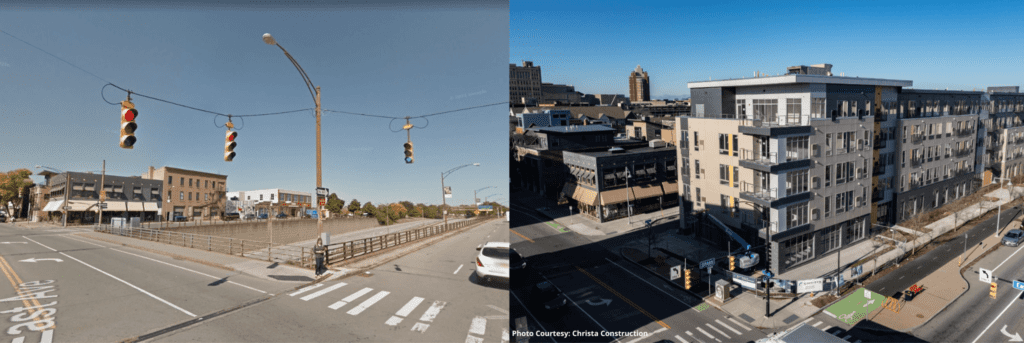Here’s what you should know.
The infrastructure bill’s Reconnecting Communities program has spurred questions since the Biden administration first proposed it in March 2021. A federal program dedicated to fixing the damage highways cause to communities? Can you actually get rid of a highway? (Yes, you can, see Rochester, NY among other examples.) What are the benefits? (Turns out there are many!) Is there public demand for this kind of thing? (Yes, a ton!)
Today, this first-of-its-kind program goes live. Here’s what you should know about it.
What does the Reconnecting Communities program do?
Big roads are dangerous barriers to walking and biking and divide communities from each other. Historically, highway builders often routed these roads in ways that displaced Black, brown, and low-income communities, separated them from the rest of a city, and subjected them to the road’s pollution.
The Reconnecting Communities program offers planning and construction grants for projects seeking to reverse these effects. Removing highways is definitely on the table, but that’s not all. USDOT has designed the program to be widely applicable and deal with all types of transportation infrastructure barriers, including state roads along small-town Main Streets and railroad tracks. The program also supports mitigations like highway caps, which can be an improvement over the status quo but do little to remedy the effects of vehicle pollution and overreliance on cars.

How much funding is available?
The Biden administration’s original proposal included $20b for the Reconnecting Communities program. Infrastructure bill negotiations cut that down to just $1b, far less money than is needed to properly address the problem at hand.
Fortunately, USDOT has found a solution to provide additional funding. Competitive Reconnecting Communities projects will be flagged as ‘Highly Recommended’ for other USDOT discretionary grants, like Rebuilding American Infrastructure with Sustainability and Equity (RAISE) or Multimodal Projects Discretionary Grant (MPDG) programs.
From the $1b alone, USDOT anticipates funding the construction of up to 20 projects and will give out at least 125 planning grants.
Who can apply?
The usual state and local agencies are eligible to apply, but USDOT also invites applications from non-profit organizations. Local non-profits may be particularly interested in planning grants, which can be used for public engagement activities, community visioning sessions, and capacity building.
Why we’re encouraged
While the Biden administration has always framed Reconnecting Communities as a reparative program, intended to heal the harms caused by highways and help affected communities rebuild, the legislative text of the program didn’t make that explicit. With its Notice of Funding Opportunity, USDOT has signaled it will prioritize projects that address inequities and build a community vision.
The program application also repeatedly emphasizes that projects must develop anti-displacement measures from the start. In many cases, a highway’s presence is what keeps a neighborhood affordable; remove it and current residents run the risk of being priced out. Requirements for applicants to develop policies and programs to keep residents in place mean they’ll actually be the ones to benefit from a Reconnecting Communities project.
Last, but certainly not least, Reconnecting Communities projects are evaluated on whether or not they increase the supply of housing (!) that’s affordable in mixed-income, mixed-use neighborhoods. So the program isn’t just about getting rid of big roads; it’s setting out to build complete neighborhoods and restore communities. The program has the power to turn highways into homes.
What you can do?
Know a highway that’s got to go? This is your opportunity to start a conversation with your local and state officials and ask them to apply for a Reconnecting Communities planning grant. Alternatively, you might talk to a like-minded non-profit about applying, since they’re eligible too. Do note that USDOT is prioritizing applications from partnerships, so if your local and state officials and community-based non-profit apply together, their application will be even stronger.
Taking the first steps and want to connect with and learn from other freeway fighters? America Walks is co-host of the Freeway Fighters Network, a nationwide coalition of local advocates seeking to reconnect communities divided by highways and stop harmful highway expansions. Join up here!
So spread the word. Years ago, the idea of dismantling a highway in a neighborhood would have been met with skepticism, despite the clear benefits. But programs like Reconnecting Communities show another way forward, one that puts people before highways.
Further information:
Interested? USDOT is hosting a webinar with additional details on the selection criteria for the Reconnecting Communities program Thursday, July 14, 2022, from 12 PM to 1:30 PM EDT.
Applications for the FY 2022 Reconnecting Communities Program close 11:59 PM EDT on Thursday, October 13, 2022.
For more information on the program, visit USDOT’s website.